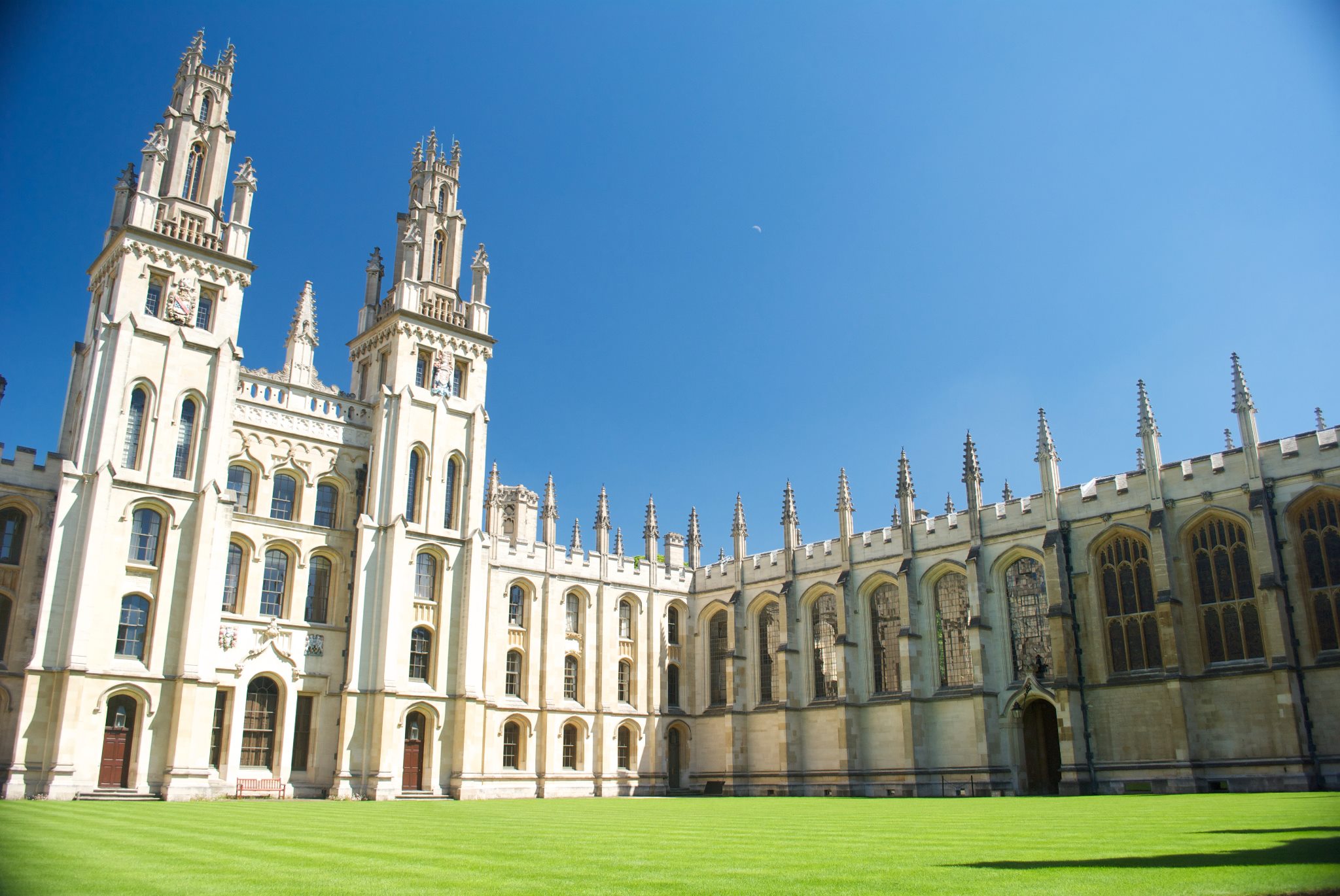University Offices, Wellington Square, Oxford, OX1 2JD, United Kingdom
Career Counselling

The University of Oxford is located in the town of Oxford in England. Academic activity in this town began in 1096, and it is the oldest university in the Western World. It has grown into one of the most respected universities in the world, with approximately 12,000 undergraduates and 12,000 postgraduates enrolled.
Within Oxford, there are 39 colleges, 5 Permanent Private Halls, and four main divisions (Science, Humanities, Social Science, and Medicine
| Establishment year | 1096 (approximately) |
| Total Students | 26,455 |
| International Students | 11,960 |
| QS World University Rankings 2024 | 3 |
| Campus Size | 1327 acres |
| Total Number of Campuses | 1 |
| University Website | https://www.ox.ac.uk/ |
| No. of Schools and Divisions | 4 Divisions; 39 Colleges, 5 Private Halls |
| Nobel Prize Winner Alumni | 56 |
| No. of Education Programs | 350 (Graduate), 231 (undergraduate) |
| Student to Faculty ratio | 4:1 |
The University of Oxford offers UG, PG, and PhD courses within its many departments, which are all organized into four divisions. Here are more details about the divisions:
● The Mathematical, Physical, and Life Sciences Division offers undergraduate, postgraduate, and doctoral courses through 11 different departments. Most of these departments focus on aspects of physical science (Physics, Chemistry, Earth Sciences, and Materials), with one department each dedicated to Engineering Science, Mathematics, and Biology.
● The Medical Sciences Division offers UG, PG, and research courses and programs in Medicine and Biomedical Sciences. It consists of 16 departments, ranging from Biochemistry to Oncology and Psychiatry. This division has been responsible for many high impact breakthroughs in the medical field.
● The Humanities Division offers undergraduate, postgraduate, and doctoral courses in disciplines as varied as the arts, classics, history, philosophy, and linguistics. It contains 14 different departments.
● The Social Sciences Division is a center for excellence in undergraduate teaching and postgraduate research in the social sciences. Its 15 departments include the Said Business School (SBS), economics, international development, law, archaeology, and geography.
There are also two more sections that function almost like Divisions in their own right: Gardens, Libraries, and Museums (GLAM), and the Department of Continuing Education.
The admissions to Oxford are very competitive: on average, the university makes an admissions offer to 16% of the 20,000 applicants in any given year. Unlike many other top universities in the world, Oxford welcomes both fresh students right out of school and older students to its undergraduate programmes: a percentage of the admissions every year are for students enrolling for a second undergraduate degree.
Given the strict academic excellence criteria and selective nature of the application process for undergraduates, the score in the A-Levels (or equivalent 12th standard performance for international students) is of paramount importance. In addition, strong scores on the SAT or ACT, and on the TOEFL or IELTS tests, are recommended.
For postgraduate admissions, in addition to test scores and academic performance during UG studies, it is also important to show research excellence and internship experience as a differentiator; when the best in the world apply, it is always best to set one’s application apart.
Most candidates start working on their application in May or June of the year before they want to join: after choosing a course and crafting a personal statement, they put together their academic and professional references.
These are the steps in the application process:
● Filling up the UCAS Admission Form: The University and Colleges Admissions Service form is to be filled by any student who seeks admission to an undergraduate degree in the UK. A candidate can start filling the form in May, and the deadline to complete it is usually October 15
○ The form can be accessed on the UCAS website
○ It is very detailed: applicants need to fill in their personal and academic details, and additional background information, while taking care to make no errors
○ It also contains sections where applicants can submit a personal statement and letters of reference from recommenders
● Completing Admissions Tests: Many courses, at both the UG and PG levels, require the candidate to take an additional test of expertise in the field of study. Applicants need to register on the Oxford website by September 30, and the test will be held within two months of that date
● Submitting Essays: Over and above the information in the UCAS form, candidates will need to submit their written work to the Oxford website by November 10; these are usually essays that help the admissions committee understand the suitability and motivation of the applicant, and form the basis of many interview questions
● Shortlisting and Interview Process: After the form, tests, and essays are submitted, each course releases a shortlist; applicants who are shortlisted will be interviewed over video call during the month of December
● Admit Offer: After the committee scrutinizes all the application material and interview performance details, the chosen applicants will be given an offer, and their place will be confirmed, subject to completion of any additional requirements (e.g. submission of academic transcripts)
Oxford has been one of the best universities in the world for many centuries, and this enviable reputation comes with fairly high academic and accommodation fees. Here is an overview of the average cost of education at Oxford University for a single year in an undergraduate program. This is for overseas (or international) students.
The tuition fee forms the largest chunk of the overall expenditure, with the average cost for UG students settling at £28,950 annually. Additional costs (primarily Housing, Dining, and Personal Items) total £17,370 on average per year. Most undergraduates can expect to spend £46,320 p.a. on their education at Oxford. However, students of the Medical division end up paying £61,610 on average, due to the additional Clinical Medicine Fees.
For postgraduate courses, the fees are substantially higher, with the tuition fees for the average MS degree settling near £40,000 per year, but teaching and research assistantships defray these costs substantially. The highest tuition fees payable are in the Said Business School, where annual fees are above £70,000.

All the constituent colleges of the University are spread across Oxford city. It is located close to London, and the architecture of the town - with heavy usage of stone structures, and the iconic spires of the towers and cathedrals - sets it apart from every other institute of higher learning. There is also natural beauty throughout: meadows, gardens, parks, and rivers allow for recreations, walks, and sports.
Oxford may have a reputation for academic achievement, but this has not come at the cost of sports: 283 students from the University have represented their countries at the Olympics, and 167 of them have been awarded medals, with over 50% of these being gold. There is a large sports complex in the city, and a campaign called Active at Oxford encourages all students to take up a sporting or fitness activity.

Health and fitness are key priorities for the tens of thousands of students and staff members who make up the Oxford community: There are options to enroll in gym sessions, swimming classes, running routines, racket sports, and group exercise classes. After all, the home of the greatest minds in the world must also allow their owners to keep their bodies healthy!
The tradition of all-round excellence at Oxford has led to both its undergraduate and postgraduate students being favorite targets of recruiters: 91% of graduating students received job offers or further study admissions upon graduation last year, and a substantial portion of the others chose to exit the process to start their own venture. The average annual salary of the graduating class usually peaks in the Business School, with SBS reporting £78,895 as the mean package, with the highest reportedly settling well above £200,000. From every one of the Fortune 500 companies, to boutique consulting and investment banking firms, to policymakers in the world’s major governments, everyone hires from Oxford University.
Not all students have to pay the full fees listed above: if an applicant has valid financial reasons combined with an excellent academic record, there are multiple scholarship options available at Oxford. Here are some details:
Undergraduate scholarships: The process for applying for these is not separate from the main application: based on the information provided by an applicant, the University will automatically consider the candidate for scholarships where the eligibility criteria are met. The decision on award of scholarships is made between February and June of the admit year.
Postgraduate scholarships: These may be provided by Research Councils or by the department (studentships): the application process for each can be found on the relevant course webpage.
The Rhodes Scholarship: The oldest regularly offered scholarship opportunity in the world, the Rhodes Scholarship has given the most talented students in the world the chance to study at Oxford, with their entire tuition fee paid, with an additional stipend of £17,000 per year to pay for housing and living costs. The criteria have remained the same for over 120 years: academic excellence, ability to use one’s talents, and strong ethics and character. The application process is via the Rhodes Trust page on the Oxford website.
It is very important that an applicant starts looking at funding and scholarship options well before the admit decision: planning is key, and making sure that the application for a scholarship is submitted well before the deadline. Competition for scholarships at Oxford is even higher than the competition for seats! In addition, information on external funding sources and loans can be found on the Oxford website, in the funding section: a university scholarship can be supplemented with one of these.
